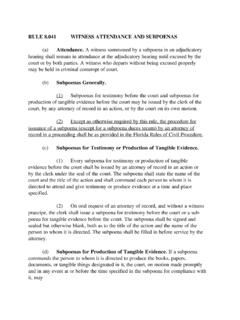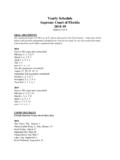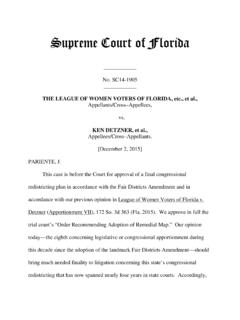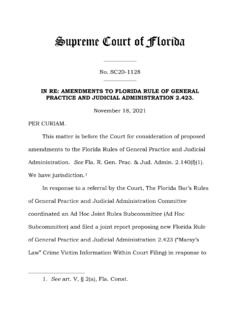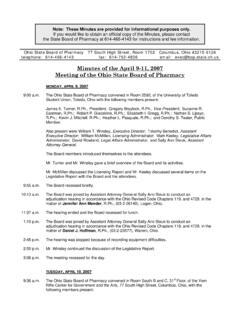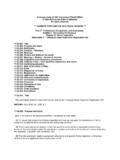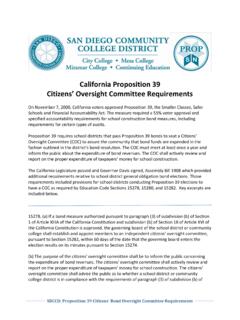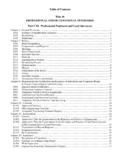Transcription of FLORIDA RULES OF JUDICIAL ADMINISTRATION REVISED …
1 1 FLORIDA RULES OF JUDICIAL ADMINISTRATION REVISED TABLE OF CONTENTS AND TEXT OF REORGANIZED RULES PART I. GENERAL PROVISIONS SCOPE AND PURPOSE DEFINITIONS PRIORITY OF CONFLICTING APPELLATE RULES AMENDING RULES OF COURT PART II. STATE COURT ADMINISTRATION THE SUPREME COURT DISTRICT COURTS OF APPEAL TRIAL COURT ADMINISTRATION CONFERENCE OF COUNTY COURT JUDGES JUDICIAL MANAGEMENT COUNCIL TRIAL COURT BUDGET COMMISSION DISTRICT COURT OF APPEAL BUDGET COMMISSION DETERMINATION OF NEED FOR ADDITIONAL JUDGES DETERMINATION OF THE NECESSITY TO INCREASE, DECREASE, OR REDEFINE APPELLATE DISTRICTS CASE REPORTING SYSTEM FOR TRIAL COURTS TIME STANDARDS FOR TRIAL AND APPELLATE COURTS AND REPORTING REQUIREMENTS STATEWIDE GRAND JURY CHANGE OF VENUE MUNICIPAL ORDINANCE VIOLATIONS 2 PART III. JUDICIAL OFFICERS JUDICIAL DISCIPLINE, REMOVAL, RETIREMENT, AND SUSPENSION CONTINUING JUDICIAL education DISQUALIFICATION OF TRIAL JUDGES PART IV.
2 JUDICIAL PROCEEDINGS AND RECORDS POSSESSION OF COURT RECORDS PUBLIC ACCESS TO JUDICIAL BRANCH RECORDS RETENTION OF COURT RECORDS RETENTION OF JUDICIAL BRANCH ADMINISTRATIVE RECORDS TECHNOLOGICAL COVERAGE OF JUDICIAL PROCEEDINGS PART V. PRACTICE OF LAW A. ATTORNEYS ATTORNEYS FOREIGN ATTORNEYS B. PRACTICE AND LITIGATION PROCEDURES SIGNATURE OF ATTORNEYS AND PARTIES PAPER ELECTRONIC FILING COMMUNICATION EQUIPMENT 3 COURT REPORTING NOTICES TO PERSONS WITH DISABILITIES CASE MANAGEMENT CALENDAR CONFLICTS INITIATION OF CRIMINAL PROCEEDINGS [Scrivener s note: The JUDICIAL branch records retention schedule for administrative records, which appears as an unofficial appendix to the RULES in FLORIDA Bar and Thomson/West publications, has been omitted from this filing.] 4 PART I. GENERAL PROVISIONS RULE SCOPE AND PURPOSE These RULES , cited as FLORIDA RULES of JUDICIAL ADMINISTRATION and abbreviated as Fla.
3 R. Jud. Admin., shall take effect at 12:01 on July 1, 1979. They shall apply to administrative matters in all courts to which the RULES are applicable by their terms. The RULES shall be construed to secure the speedy and inexpensive determination of every proceeding to which they are applicable. These RULES shall supersede all conflicting RULES and statutes. RULE DEFINITIONS The following terms have the meanings shown as used in these RULES : (a) Court Rule: A rule of practice or procedure adopted to facilitate the uniform conduct of litigation applicable to all proceedings, all parties, and all attorneys. (b) Local Court Rule: (1) A rule of practice or procedure for circuit or county application only that, because of local conditions, supplies an omission in or facilitates application of a rule of statewide application and does not conflict therewith. (2) A rule that addresses other matters that are required by the FLORIDA Constitution, general law, RULES of court, or a supreme court opinion to be adopted by or in a local rule.
4 (c) Administrative Order: A directive necessary to administer properly the court s affairs but not inconsistent with the constitution or with court RULES and administrative orders entered by the supreme court. RULE PRIORITY OF CONFLICTING APPELLATE RULES The FLORIDA RULES of Appellate Procedure shall control all proceedings in the supreme court and the district courts, and all proceedings in which the circuit courts exercise their appellate jurisdiction, notwithstanding any conflicting RULES of procedure. 5 RULE AMENDING RULES OF COURT (a) Amendments Generally. The following procedure shall be followed for consideration of rule amendments generally other than those adopted under subdivisions (d), (e), and (f): (1) Proposals for court RULES , amendments to them, or abrogation of them may be made by any person. (2) Proposals shall be submitted to the clerk of the supreme court in writing and shall include a general description of the proposed rule change or a specified proposed change in content.
5 The clerk of the supreme court shall refer proposals to the appropriate committee under subdivision (a)(3). (3) The FLORIDA Bar shall appoint the following committees to consider rule proposals: Civil Procedure RULES Committee, Criminal Procedure RULES Committee, Small Claims RULES Committee, Traffic Court RULES Committee, Appellate Court RULES Committee, Juvenile Court RULES Committee, Code and RULES of Evidence Committee, RULES of JUDICIAL ADMINISTRATION Committee, Probate RULES Committee, and Family Law RULES Committee. (4) Each committee shall be composed of attorneys and judges with extensive experience and training in the area of practice of the committee calling for regular, frequent use of the RULES . The members of the committee shall serve for 3-year staggered terms. The president of The FLORIDA Bar shall appoint the chair and vice chair of each committee. (5) The RULES of JUDICIAL ADMINISTRATION Committee shall also serve as a RULES coordinating committee.
6 Each RULES committee shall have at least 1 of its members appointed to the RULES of JUDICIAL ADMINISTRATION Committee to serve as liaison. All proposed RULES changes shall be submitted to the RULES of JUDICIAL ADMINISTRATION Committee, which shall then refer all proposed RULES changes to those RULES committees that might be affected by the proposed change. All proposed changes shall be submitted by June 15 of each year of the RULES cycle. (6) The committees shall consider and vote on each proposal. The committees may originate proposals and are charged with the duty of regular 6 review and reevaluation of the RULES to advance orderly and inexpensive procedures in the ADMINISTRATION of justice. The committees may accept or reject proposed amendments or may amend proposals. The committees shall keep minutes of their activities, which minutes shall reflect the action taken on each proposal.
7 Copies of the minutes shall be furnished to the clerk of the supreme court, to the board of governors of The FLORIDA Bar, and to the proponent of any proposal considered at the meeting. (b) Schedule for RULES Proposals. (1) Each committee shall report all proposed rule changes on a staggered basis (with the first cycle starting in 2006). Reports shall be made by the Criminal Procedure RULES Committee, the Traffic Court RULES Committee, and the Juvenile Court RULES Committee in 2006; by the Civil Procedure RULES Committee, the Probate RULES Committee, the Small Claims RULES Committee, and the Code and RULES of Evidence Committee in 2007; and by the Family Law RULES Committee, the Appellate Court RULES Committee, and the RULES of JUDICIAL ADMINISTRATION Committee in 2008. Thereafter, the cycle shall repeat. (2) No later than June 15 of the year prior to each reporting year or such other date as the board of governors of The FLORIDA Bar may set, each reporting committee shall submit all proposed rule changes to the board of governors with the committee s final numerical voting record on each proposal.
8 Contemporaneously with reporting proposed rule changes to the board of governors, each committee report shall be furnished to the Speaker of the FLORIDA House of Representatives, the President of the FLORIDA Senate, and the chairs of the House and Senate committees as designated by the Speaker and the President, and published on the Internet website of The FLORIDA Bar, and in the FLORIDA Bar Journal or FLORIDA Bar News. Any person desiring to comment upon proposed rule changes shall submit written comments to the appropriate committee chair no later than August 1 of the year prior to each reporting year. Each committee shall consider any comments submitted and thereafter report to the board of governors, no later than October 15 of the year prior to each reporting year, any revisions to the proposed rule changes. Contemporaneously with reporting any revisions to the board of governors, each committee s REVISED proposed rule changes shall be furnished to the Speaker of the FLORIDA House of Representatives, the President of the FLORIDA Senate, and the chairs of the House and Senate committees as designated by the Speaker and the President, and published 7 on the Internet website of The FLORIDA Bar, and in the FLORIDA Bar Journal or FLORIDA Bar News.
9 Any person desiring to comment thereafter shall submit written comments to the supreme court in accordance with subdivision (b)(6). (3) No later than December 15 of the year prior to each reporting year, the board of governors shall consider the proposals and shall vote on each proposal to recommend acceptance, rejection, or amendment. (4) No later than February 1 of each reporting year, each committee shall file a report of its proposed rule changes with the supreme court. Each committee may amend its recommendations to coincide with the recommendations of the board of governors or may decline to do so or may amend its recommendations in another manner. Any such amendments shall also be reported to the supreme court. The report shall include: (A) a list of the proposed changes, together with a detailed explanation of each proposal and the name and address of the proponent of each change if other than the RULES committee; (B) the final numerical voting record of the proposals in the committee; (C) a report of the action taken by the committee on comments submitted in accordance with subdivision (b)(2); (D) a report of the action and voting record of the board of governors; (E) any dissenting views of the committee and, if available, of the board; and (F) an appendix containing all comments submitted to the committee and a two-column chart setting forth the proposed changes in legislative format in the first column and a brief explanation of each change in the second column.
10 The report and the proposed rule changes shall be filed with the supreme court, in legislative format, both on paper and in an electronic format approved by the supreme court. (5) If oral argument is deemed necessary, the supreme court shall 8 establish a date during the month of May or June of each reporting year for oral argument on the proposals. Notice of the hearing on the proposals and a copy of the proposals shall be furnished to the affected committee chair and vice chair, the executive director of The FLORIDA Bar, all members of the JUDICIAL Management Council, the clerk and chief judge of each district court of appeal, the clerk and chief judge of each JUDICIAL circuit, the Speaker of the FLORIDA House of Representatives, the President of the FLORIDA Senate, the chairs of the House and Senate committees as designated by the Speaker and the President, and any person who has asked in writing filed with the clerk of the supreme court for a copy of the notice.

